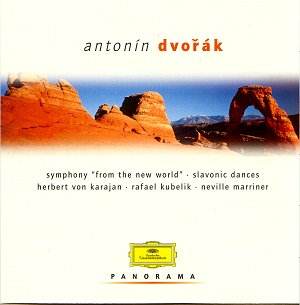Antonin DVORAK (1841-1904)
Symphony No. 9 in E minor, B178, 'From the New
World'a. Piano Trio in E minor, B144,
'Dumky'b. Slavonic Dances,
B83c. Serenade for Strings in E,
B52d. Carnival Overture,
B169c.
 aBerlin Philharmonic
Orchestra/Herbert von Karajan; bBeaux Arts Trio;
cBavarian Radio Symphony Orchestra/Rafael Kubelik;
dAcademy of St. Martin-in-the-Fields/Sir Neville
Marriner.
aBerlin Philharmonic
Orchestra/Herbert von Karajan; bBeaux Arts Trio;
cBavarian Radio Symphony Orchestra/Rafael Kubelik;
dAcademy of St. Martin-in-the-Fields/Sir Neville
Marriner.
 DG Panorama 469 133-2
[140'34] [ADD] Recorded
1964-77.
DG Panorama 469 133-2
[140'34] [ADD] Recorded
1964-77.
Crotchet

There are some real gems in this set - certainly enough to justify the modest
outlay. For pure joie de vivre, the infectious performance by Kubelik
of the Slavonic Dances, Op. 46 is hard to beat. The second (in E minor),
for example, has real swagger and character and yet at the same time everything
is so carefully balanced that nothing sounds congested. It may date from
the mid-seventies, but the years have done nothing to dim the sparkle in
this performance's eye. The Carnaval Overture, from two years later,
has the same qualities and is a perfect feel-good way to end the set.
The highlight of the Beaux Arts Trio's account of the Dumky Trio is
the intimate, whispered Poco adagio. Elsewhere they play with lively, pointed
rhythms and an appropriately light touch in the fifth movement. This performance
brings a problem in its wake, however: how does one adjust to its life-affirming
virtues after Karajan's closely-recorded, big, schmaltzy New World,
complete with ponderous Largo and fit only for the Karajan-club?
Sir Neville Marriner's Serenade, made with his 'other half' of the
period, the Academy of St. Martin-in-the-Fields, is characteristic of the
clean, unfettered approach which characterised recordings from this combination.
The Scherzo is fresh, the Menuetto elegant. Only when one encounters the
last movement does some strain become apparent from the high strings.
Buy this set, play the Slavonic Dances. And smile.
Reviewer
Colin Clarke
Performances Slavonic Dances and Carnaval

Trio and Serenade

'New World'

Recording

